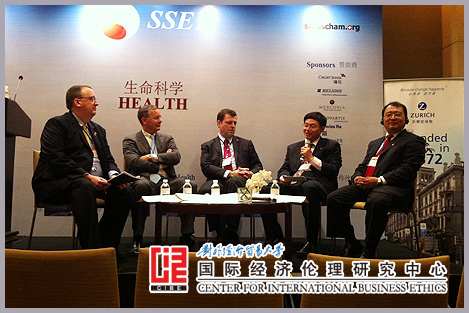 Professor Hengda Yang, deputy director of CIBE, attended the 2nd Sino-Swiss Economic Forum on July 10, 2012. The Forum was organized by the Embassy of Switzerland in China and the Swiss Chamber of Commerce. The Partners are Swiss Business Hub China, which is dedicated to promoting Sino-Swiss trade and investment, and Cleantech Switzerland. At the Forum, 250 experts and attendees participated in discussions on different themes involving industry, finance, health and cleantech. Professor Hengda Yang, deputy director of CIBE, attended the 2nd Sino-Swiss Economic Forum on July 10, 2012. The Forum was organized by the Embassy of Switzerland in China and the Swiss Chamber of Commerce. The Partners are Swiss Business Hub China, which is dedicated to promoting Sino-Swiss trade and investment, and Cleantech Switzerland. At the Forum, 250 experts and attendees participated in discussions on different themes involving industry, finance, health and cleantech.
The Forum served as a platform for discussions on current topics between Switzerland and China, enhancing mutual understanding and seeking for opportunities for co-operation in many other fields. H.E. Mr. Blaise Godet, Ambassador of Switzerland, H.E. Mr. Zhong Shan, Vice Minister of Commerce, and H.E. Mr. Johann Schneider-Ammann, Federal Councilor of Switzerland, each gave speeches , and Mr. Peter Troesch, President of Swiss Chamber of Commerce, delivered an acknowledgment of sponsors. After that was the Signature of the “Sino-Swiss Zhenjiang Ecological Industrial Park” Framework Agreement and the “Maanshan New Energy Benchmark Development Plan” Contract.
After an introduction of the Swiss economy and business and the Investment Seminars, there were four workshops on industry, finance, health and cleantech. Professor Yang took part in the Health workshop. Panelists and participants started discussions with food safety, the current situation and solutions. Although there are many laws and regulations related to food safety in China, many Chinese are concerned because of the emerging food safety scandals. The panelists believed that with rapid development of the economy, some enterprises choose the pursuit of economic benefits and not social responsibilities. At the same time, the unbalanced development between Eastern and Midwestern China and unregulated supervision lead to these food safety scandals. Therefore it was agreed that law enforcement must be strengthened so that no enterprises dare to defy the law. Addressing current matters, one possible solution is “the model of whole industry chain”—set up a production base at the supply source and take the whole production process such as food production and sales under control. However, only a few large enterprises such as COFCO can afford such high costs, although some large supermarkets set up “Direct Supply Between Farmers & Supermarkets” in order to reduce intermediate procedures and cost. Institutions and individuals are paying increased attention to food related issues. Corporations are responding to this movement by developing inspection standards to enhance consumer confidence and food safety.
|
